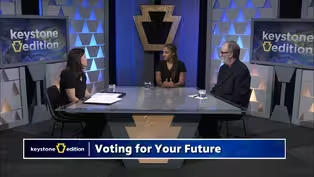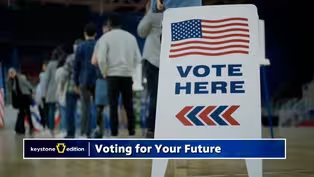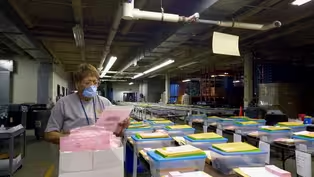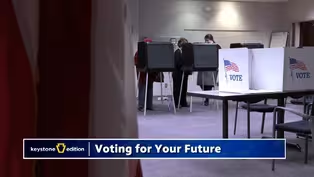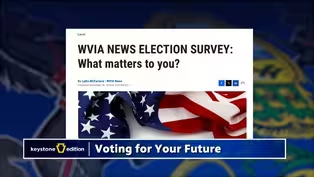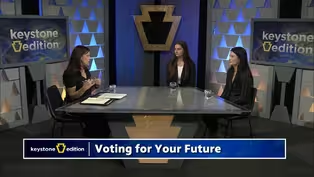Keystone Edition
Voting for Your Future - Election 2024
10/7/2024 | 26m 59sVideo has Closed Captions
A discussion of this election's historic nature, and significant local races on the ballot.
Experts will discuss this upcoming election’s historic nature – voters will either elect the first woman president, not to mention the first Indian-American, or they’ll re-elect a former president for only a second time. They’ll also talk about the presidential candidates and significant local races on the Nov. 5 election ballot.
Problems playing video? | Closed Captioning Feedback
Problems playing video? | Closed Captioning Feedback
Keystone Edition is a local public television program presented by WVIA
Keystone Edition
Voting for Your Future - Election 2024
10/7/2024 | 26m 59sVideo has Closed Captions
Experts will discuss this upcoming election’s historic nature – voters will either elect the first woman president, not to mention the first Indian-American, or they’ll re-elect a former president for only a second time. They’ll also talk about the presidential candidates and significant local races on the Nov. 5 election ballot.
Problems playing video? | Closed Captioning Feedback
How to Watch Keystone Edition
Keystone Edition is available to stream on pbs.org and the free PBS App, available on iPhone, Apple TV, Android TV, Android smartphones, Amazon Fire TV, Amazon Fire Tablet, Roku, Samsung Smart TV, and Vizio.
Providing Support for PBS.org
Learn Moreabout PBS online sponsorship- [Announcer] Live from your public media studios, WVIA presents "Keystone Edition Reports," a news and public affairs program that goes beyond the headlines to address issues in Northeastern and central Pennsylvania.
This is "Keystone Edition Reports."
And now, moderator, Julie Sidoni.
- Welcome to "Keystone Edition Reports," now in our fifth season, but with a new host.
I'm Julie Sidoni, the director of journalism at WVIA.
And it might come as no surprise that our first episode in this fifth season is all about the upcoming general election.
(frame whooshing) (light music) In just about a month, Americans go back to the voting booth.
It has been a noisy few years of campaigning, interviews, polls, and debates for what's largely considered one of the most anticipated elections in recent history.
"WVIA News" has been working hard to find out what concerns you the most this election season, from the environment to women's health, to the health of the economy.
And "Keystone Edition Reports," again, now in its fifth season, is back.
We begin with a look at what voters in Northeastern and central Pennsylvania might be thinking.
In this half hour, we will talk with representatives from both young Democrat and Republican organizations in the area.
We're gonna try to get a sense of what role different generations might play on election night, and we'll hear from two WVIA journalists who've been covering this election about what they are seeing and hearing.
Now, we know a youth vote could play a big role in who wins Pennsylvania and the presidential election.
A "New York Times" Siena College poll released late last month showed that if the election were held today, 58% of voters aged 18 to 29 would vote for Kamala Harris, whereas 37% would vote for Donald Trump.
5% are undecided, or didn't answer.
A different poll released late last month from the Harvard Kennedy School Institute of Politics has Harris with a 31-point lead over Trump among voters 18 to 29.
Here to share their views on the election are Brigid Carlin, a senior at The University of Scranton and president of the university's College Democrats Club, and Katelin Schooley, who's a senior at Wilkes University and an intern for Republican Congressional candidate, Rob Bresnahan's, campaign.
Katelin and Brigid, I am so glad that you've joined us today.
Don't be nervous.
(all laugh) It will all be just fine.
I would really like to start actually by asking a bit of a personal question of both of you, is what got you involved in politics at such a young age?
- So I've been involved with politics as early as I can remember.
My grandfather, I'm from Rhode Island originally, so my grandfather was in the state senate when I was little.
And then my parents have always, you know, talked politics and stuff with me growing up.
So the first big election that I can remember was back in 2016, that was when I was really passionate about politics, and we had a mock election in my middle school.
So that was sort of my gateway, and now I major in it.
- It kind of opened your eyes to what was out there.
- [Brigid] Right.
- I'll ask you the same, Katelin.
- I probably started out really getting into it in middle school.
I did a project of, like, what you wanna do in the future, and I found that I wanted to go into the military.
So I went to Wilkes University for the Air Force ROTC program.
And with that, you get into politics a little bit as to like what the military's doing.
So my current role, I'm an intern on Rob Bresnahan's campaign, and I got an email from school, they were looking for interns, and I applied and just hit the ground running from there.
- We're particularly interested in what people your age have to say about the election, and what they're seeing and hearing.
And I know you're both in your early twenties, so let's talk a little bit, not just personally, but what are you seeing and hearing from your peers?
I mean, just in general, are people paying attention to the election?
Are they not caring about the election?
Are they very passionate about the election?
Where are your friends, and even the family members who might be in your age group, where are they falling in this?
- So through my internship, Luzerne County young Republicans have been really coming out to support the younger candidates.
We have two really young candidates right now, both Rob Bresnahan and McKayla Kathio.
So we're trying to bring younger, new representatives into the area.
- Is that kind of one of the things you're hoping as the Republican party?
Like, "Hey, these are young candidates.
Hey, youth voters, pay attention to this."
Is that something that you're trying to do as a campaign?
- I'd say yes.
We've had a lot of support from college students.
We have a group of college students who go out and do doors for Rob's team, and do different events well.
So I'd say yes.
A lot of young people are helping with the campaigns and trying to get people... - To get involved.
- Yeah.
(laughs) - Brigid, what about you?
Same question?
- I would say the same.
As in terms of the College Democrats Club on my own campus, most of our members are freshmen or sophomores, which means that a lot of, especially younger people within the Gen Z population, are really engaged and really paying attention.
I know my little siblings are also very engaged.
The family group chat goes off almost every day about something new.
(all laugh) - Both of you brought up going door-to-door and canvassing.
And I would love to hear your impressions, because now we're talking about not just people that you know, people on a college campus who may be more likely to wanna talk to you.
I mean, going door-to-door is difficult work.
So let's start with you again.
What are you finding when you go to talk to people?
Is it as scary out there as some people think it is?
- It's definitely not as scary out there as some people think it is.
I mean, at the core of it, I'm a human and I'm talking to a human behind a door, so it's much easier for, I mean, it's much harder for them to slam a door in my face than to hang up on the phone.
But with that being said, I would say that a lot of people that I've talked to, at least going door-to-door, have their minds made up about who they're voting for.
- [Julie] Already?
- Right.
- Is that a generational thing, or do you think that's across the board?
- It's hard to say honestly.
I think that a lot of people that I talk to on a personal basis know who they're voting for already, and part of it is either agreeing with them or trying to change their mind.
So I think that if there's an issue that you've seen represented that you're really passionate about, you already know who you're voting for.
So I think that's not a generational thing, but I think that it might be a little bit clearer to some people than others.
- In your opinion, what is the issue?
What is the issue that you're hearing most about?
- From what I've heard from doing doors a lot is about affordability for youth, for our future to buy a home, and a lot about border security.
One house that I went to while canvassing for Rob was a gentleman who moved here from Mexico, and he conveyed his, like, concerns.
He went through this whole process to become a United States citizen, and now he's seeing hundreds of thousands of people cross the border without having to go through those same channels that he did.
So he is just very frustrated with the whole sense of the situation.
- That's interesting to me because one of those topics is right here at home, you know?
Can I afford a house in a couple years when I graduate?
And the other one is happening on the other side of the country.
And I have wondered how much people, you know, around the nation react differently to immigration.
What is your one topic that you're hearing the most about?
- The one topic that I'm hearing the most about is reproductive rights and reproductive healthcare.
So a lot of women, especially Gen Z voters and younger women, are particularly concerned about the rights that they'll have in the future.
And not just women, men too.
I've talked to a couple of my male friends on campus and they have sort of the same level of concern that I do about that, because it's not, you know, just a women's issue, although it is a woman's issue.
(laughs) - Right.
So you mentioned having a debate party, a party for the vice presidential debate.
Let's talk a little bit about the VP candidates.
I mean, not necessarily the two of them themselves, but what are you hearing about the VP candidates?
Do you think that the choices are helping the presidential candidates?
Or do you see that sort of going the other way?
- Honestly, I hate to say it, I've seen a lot of support for Vance after the vice presidential debate, because he was just so polished and spoke so cleanly.
But I related to what Walz was saying more than Vance's style, if that makes sense.
- [Julie] It does.
- Although I believe that, you know, Vance is a great speaker, and he looked really good on that stage, Walz was talking about issues, and I know that he can back it up with facts that are from off the stage, not just on the stage.
- Do you have a comment there, or are you hearing anything about the VP race that is either infusing the presidential race with energy?
Or maybe that's not happening from where you stand?
- Yeah, from what I've heard, everybody's been liking Vance, especially after the debate.
They really liked what he had to say and how he conveyed his message, and that he's, like, a good running mate for Trump.
So I haven't heard anything negative from that.
- I will say too, a lot of what I've seen on social media was just general support for both of the candidates in that they were respectful, they shook hands, they talked to each other.
You know, that moment when Vance expressed his condolences for Tim's son was, you know, heard by a lot of people.
- This could be a whole other topic, (both laugh) but social media interests me because it's not something that I grew up with, and it's something that has just always been part of your lives.
One of the last things I wanna talk about is the role of social media and how you think that the internet, in general really, but how you think social media is going to affect this?
Do you have a comment on that?
- I think social media really helps, like, all of our candidates.
Our younger generation, we're all on social media, so that's like a main source for a lot of our news and just content on the campaign in general.
So I think it's really helping on both ends.
- What about you?
- I agree with Katelin.
I think that overall social media is a good thing and it's allowed us to connect with people that we wouldn't have been able to connect with, had social media not been present.
But I will say too that it can be detrimental and you have to be careful about what you're looking at, and fact-checking.
A lot of people are so quick to, you know, repost something on their story, or like or reshare or something like that.
So you just have to dig in a little deeper and say, okay, "Where is this coming from?
Can I trust that source," you know?
Stuff like that.
- Media literacy, - Right.
(laughs) - That's a big topic.
- Right.
- Alright, well thank you to both of you.
We spoke with students on the campus of Penn State Hazleton.
Some of those students will be voting for the first time in a presidential election.
Here's what they had to say about the issues that will impact their votes.
- Well, I'm always a bit more glued into what the economic policies of the candidates will be and how it will have impacts on my local community.
- Some values I carry that will influence my vote are abortion laws and a woman's right to access, be able to have an abortion due to health complications, or for whatever reason, she may feel the need to.
- The main topic that, like, I try to focus on is the economy.
Because, at least my family, started out a little bit like lower class, and we had to heavily work our way up.
And now with my father owning his own business, it is just a very big point of concern for me.
- I have a lot more questions for Katelin and Brigid, but unfortunately, that is all the time we have for the two of you.
Any last messages that you would like to get out to people, to your peers who might be watching this?
- Definitely do some research on all your candidate options.
Find out which candidate suits your views and what you wanna see the best.
And don't just go off of the first post you see on social media.
Make sure you're doing the background research to support your decisions.
- I would say that the most important thing I could tell someone would be to go out and vote.
No matter who you support, no matter what you believe, just go out, make your voice heard.
Because the margin by which college students and Gen Z first-time voters exist in Pennsylvania could be the margin in which we win the election or lose the election.
So just go out and make your voice heard and vote.
- Alright, thank you to the two of you.
You talked about research here, to find out more about the candidates and their positions in the general election, "WVIA News" put together a 2024 voters guide.
This is a culmination of research done using a survey to gauge the most important issues for voters in our region.
To find it, go to wvia.org and click on Election 2024 in the News section.
"WVIA News's," Lydia McFarlane, has the results of that survey.
(frame whooshing) - [Lydia] The presidential election is quickly approaching.
"WVIA News" surveyed prospective voters in Northeast and central Pennsylvania to find out what issues are important to them.
We found that local voters top concerns are the environment, women's health, the economy, gun control, and social security.
In follow-up interviews, some say they are so displeased with the economy that they are considering voting outside of party lines.
Women's health is also a huge issue for voters, and candidates and advocacy organizations know that.
Last month, Americans for Contraception brought their mascot, Freeda Womb, a 20-foot tall inflatable IUD, to Wilkes-Barre.
They, along with local advocacy group, Action Together NEPA, encouraged Luzerne County residents to vote with women's health in mind.
The next week, the Harris-Walz Fighting for Reproductive Freedom bus tour stopped in Scranton.
Both campaigns are also leaning into branding for young audiences, and the concerns of survey respondents mirror those of young voters.
Younger voters helped propel President Biden to victory in 2020.
Whoever wins that demographic could win the presidency, but they have concerns.
Young Republicans fear high prices and an expensive housing market that limits future opportunities to become homeowners or start businesses.
Young Democrats worry over the future of the country and the rights that might be taken away, including access to abortion.
The results shaped the questions we ask candidates for our Comprehensive Voters' Guide, which can be found on our website, wvia.org.
(frame whooshing) (light intense music) - [Announcer] You have a story to tell.
News is happening all around you, in your neighborhood, in your community.
"WVIA News" is capturing those stories.
- This is "WVIA News."
- [Announcer] We have a reputation for serving the community for over 50 years.
Because "WVIA News" is not-for-profit, we're for you.
These are your stories, your neighborhoods, cities, farms, communities, schools.
We're finding the stories that impact you.
And you can find us at wvia.org.
(light intense music concludes) - With the general election a month away, all eyes are on the presidential race.
But there are also Senate and congressional races getting attention.
"WVIA News" reporter, Borys Krawczeniuk, runs down some of the key races.
(frame whooshing) - [Borys] The upcoming election in Pennsylvania could have a lot to do with shaping the nation's future.
Control of Congress, the White House, and the State General Assembly are at stake as voters choose their candidates November 5th.
County Boards of Elections began processing applications for mail-in ballots weeks ago, and have already started mailing actual ballots to voters.
Of course, the presidency is the big prize with Vice President Kamala Harris and former President Donald Trump aiming to replace President Joe Biden, which, among other things, will mean Scranton no longer has a native as commander in chief.
Aside from that, Republicans would like to flip the U.S. Senate, where Democrats have a slim majority at the moment.
Democrats would like to maintain or expand their Senate control and flip the House, which is narrowly Republican.
U.S.
Senator, Bob Casey, a Scranton resident, wants a fourth six-year term, and he's facing a stiff challenge from former hedge fund manager, Dave McCormick, who lives in the Pittsburgh area.
The region also has two of the hottest congressional races in the nation.
In the district that includes Scranton, Wilkes-Barre, Hazleton, and part of the Poconos, Democratic Congressman, Matt Cartwright, wants a seventh term.
Republican businessman, Rob Bresnahan, is seeking to beat him.
They are scheduled to debate on WVIA later this month.
In the district that includes the Allentown, Bethlehem, Easton area and the rest of the Poconos, Democratic Congresswoman, Susan Wild, faces Republican State Representative, Ryan Mackenzie.
The state senate races in the northeast and north central Pennsylvania region are generally lukewarm, as are most House races, but three or four House races in Luzerne County could determine who controls the State House.
The Democrats have a one-vote majority now.
(frame whooshing) - That was Borys Krawczeniuk reporting.
He is here with us now, as well as Lydia McFarlane, two "WVIA News" journalists.
They're gonna provide some insight on the election.
Let's start with the presidential race and where it stands nationwide here in Pennsylvania.
We're gonna take a look at some poll numbers right now across the country here, Kamala Harris ahead 49.3% to Donald Trump's 47.1%.
Again, that's RealClearPolitics average polls as of Thursday, October the third.
Presidential race across Pennsylvania, Kamala Harris, 48.2%.
This one has them in a dead heat across Pennsylvania.
First of all, can we talk about polls in general?
Borys, I would love your thought about this.
Are polls to be watched?
It seems like sometimes we're surprised by polls.
- If you understand the way polls work, they're useful.
If you're looking at them as a way of predicting what's going to happen, don't do that, because they're really just a snapshot.
They reflect what voters are thinking when the questions are asked.
So it's whatever period of time that the poll happened, you know, five or six days, sometimes over a week, that's what happened.
They're also a little less reliable than they used to be because people are tired of picking up their telephones and don't answer polls, and the numbers that they do.
So there's a lot more modeling going on, which means they try to infer results and guess a little more than they used to.
Generally they're right, even though the polls showed Hillary Clinton winning 2016, she had a majority, she did best in the polls, that's not how we elect presidents.
Donald Trump won the electoral college, same thing in 2020.
- You can put some stock into them, - Sure.
- But nothing that we're gonna- - They're not gospel.
- Yeah, interesting.
Alright, let's talk about what you are both hearing, 'cause you've both been doing a lot of political reporting here in the last couple of months.
Lydia, let's talk about some of the topics that you are reporting on.
What are you hearing right there?
- Yeah, absolutely.
So I worked on a survey of voters in our region, and those survey results gauged that the top issues for local voters are, no surprise, the economy and women's health, but also gun control, social security and the environment, which was a bit of a surprise to me.
I thought, you know, economy and abortion, women's rights would be top two.
They actually came in at two and three with environment at number one.
- Environment, really?
- So, yeah, yeah.
I think it might have to do with, you know, the rural areas that we cover.
But that was a really big issue for people who took our survey.
But again, also economy and women's health, like, we're hearing from, you know, national polling, national coverage are really important issues for voters right here as well.
- Borys, what are you hearing?
- The economy is the number one issue for everybody.
So if you add up, in the most recent Franklin & Marshall Poll, if you add up economy and personal finances, it's almost 1/3 of the electorate.
I think that's the most important issue facing Pennsylvania.
But when you drill down a little bit, there's healthcare and reproductive healthcare.
Abortion are playing a much more prominent role in this election than they have in previous elections.
But the economy, and whether or not Donald Trump can maintain his edge on that, you know, that's kind of gonna be where the election in Pennsylvania's decided.
- I heard you say that the eighth congressional race is one of the hottest in the nation.
Why is everyone watching that?
- Because it's a district that Donald Trump won twice pretty decisively, and it's a district that Republicans think they can flip.
It's a district that Matt Cartwright has won, now he is going for his seventh term.
And the last three elections, he has had really tough, well-funded opponents, and he's won each by narrower margins.
So two years ago it was like 7,000 votes.
In previous elections it was a little higher.
So they think that with Trump back on the ballot, the Republicans do think that maybe this is the time, and a younger candidate, a different candidate than the last two times, that they can take out Cartwright.
- Hmm, those polls we were showing, the nationwide versus Pennsylvania poll, anything surprise you there?
I mean, obviously we know Pennsylvania is very much in play this election, but does anything surprise you there with those numbers?
- No, he's, you know, Trump has advantages in certain states because he has just been around longer.
And so I think she's gonna have to get, you know, spend some more time in Pennsylvania to boost those numbers a little bit.
- Of course there are some other races of importance, including one here in Pennsylvania for U.S. Senate.
Bob Casey with 48.8%, his challenger, Dave McCormick, 44.8%.
Again, RealClearPolitics as of Thursday, October the third.
Is this a smaller margin than we've seen for Senator Casey?
- McCormick is far better.
He's a far better candidate.
He is far better funded than Lou Barletta was, than Tom Smith was in 2012.
In 2006, Rick Santorum had more money than Bob Casey, but Bob Casey, the environment favored Casey.
But Dave McCormick is a much better candidate and is better funded than the last two candidates.
- I wanted to ask you, we had someone just a few minutes ago tell us that in 2016 it's when she was really watching.
What got you so interested in politics?
- I'd say 2008 was probably the first election that I was, you know, conscious for and understanding.
But then being in high school during the 2016 election, that's when I probably started paying attention more and realizing, you know, this is a conversation that parents are having, teachers are having.
These are results that could have real impacts on my life.
So then went through high school really interested in politics, went to college and majored in political science to kind of understand how do these elections shape our lives here at home, here in northeastern Pennsylvania?
How does the result of the presidential election impact little old me?
So that's something that I've always been really interested in, and that I'm thrilled to be reporting on now.
- What else came up in the survey?
I'm curious to know.
- Yeah, so like I said, environment was a really big one and legalization of marijuana was a big one as well.
Immigration did come up.
It wasn't one of the top five, but it did come up as a big issue for a lot of voters.
And it seemed that a lot of the issues were intertwined.
So I did a lot of follow-up interviews with voters and it seemed like if you're concerned about the economy, you know, there were people that were tying the economy to immigration and saying immigration is impacting the economy, or tying women's health to the environment.
And it just seemed like there was a lot of overlap - Lots of overlap - In the issues.
And it seems like a lot of people are more multi-issue voters than we give them credit for, which I think was surprising because I thought I was going to go into these interviews saying, "Okay, you're voting with your head, you know, set straight towards economy or straight towards women's health."
But it seemed like it was a lot broader.
And from those interviews, I also spoke to some people who were saying, "You know, I'll vote for the Republican at the top of the ticket, but I'm gonna vote for the Democrat here."
So there were people that were voting, you know, in and out of party lines, depending on the candidate.
Like we were just talking about the race with Casey and McCormick.
A lot of people, even if they were registered republicans, were saying, "You know, I don't trust him.
I'm not sold on McCormick because of, you know, his history of where he's lived and what he's done for a living."
A lot of people just seemed to like Bob Casey from those interviews that I had.
So that's something that came up as well, outside of issues, is that people vote, you know, I think a lot more in a well-rounded way than, you know, we tend to give them credit for.
- Oh, that's true.
- That's an interesting point.
You're gonna be able to hear from Matt Cartwright and Rob Bresnahan.
They're gonna be facing off in a live debate later this month.
WVIA will present Pennsylvania's eighth congressional district debate.
That's Tuesday, October 22nd at 7:00 PM from the Burke Auditorium at the campus of King's College in Wilkes-Barre.
That debate will air live on WVIA TV and also be simulcast live on WVIA radio, and live streamed at wvia.org.
One more thing before we let you go, Borys and Lydia, thank you.
We have more questions to ask you that we might do in a different way on social media.
I hope we get to that.
But we're also gonna let you in on that as well.
If there's a question I didn't ask that you would like Borys or Lydia to answer, or either of our first panelists, you can have a say with something called The Loop.
All you have to do is email your question to keystone@wvia.org.
You could be on social media with the hashtag of Keystone Reports.
We'll try to get your questions answered as well.
Again, Borys and Lydia, we have more to discuss, and, of course, there's another month coming up here.
Thank you for your work.
And that's gonna wrap up this edition of "Keystone Edition Reports."
We'll see you next time.
(light music)
Video has Closed Captions
Clip: 10/7/2024 | 8m 14s | Borys Krawczeniuk and Lydia McFarlane from WVIA News discuss the upcoming election. (8m 14s)
Video has Closed Captions
Clip: 10/7/2024 | 1m 57s | Attention is on key races in Pennsylvania that could shape the future of Congress & state leadership (1m 57s)
Voting for Your Future - Election 2024: Preview
Preview: 10/7/2024 | 30s | Watch Monday, October 7th at 7pm on WVIA TV (30s)
Voting for Your Future - Overview
Video has Closed Captions
Clip: 10/7/2024 | 50s | In the fifth season premiere of Keystone Edition Reports, we discuss the upcoming general election (50s)
Video has Closed Captions
Clip: 10/7/2024 | 1m 42s | WVIA News surveyed prospective voters in NE & central PA to find out what issues are import to them. (1m 42s)
Video has Closed Captions
Clip: 10/7/2024 | 12m 33s | An interview with young Republicans and Democrats from local Universities. (12m 33s)
Providing Support for PBS.org
Learn Moreabout PBS online sponsorship
- News and Public Affairs

Top journalists deliver compelling original analysis of the hour's headlines.

- News and Public Affairs

FRONTLINE is investigative journalism that questions, explains and changes our world.












Support for PBS provided by:
Keystone Edition is a local public television program presented by WVIA
